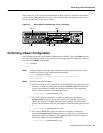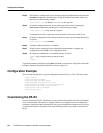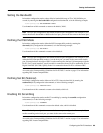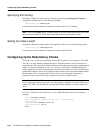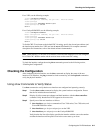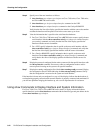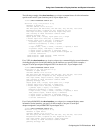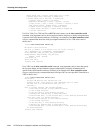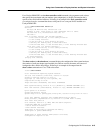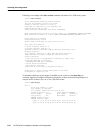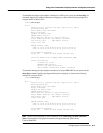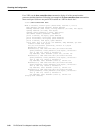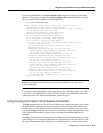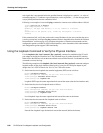
Configuring the PA-E3 Interfaces 8-19
Using the ping Command to Verify Network Connection
For a Catalyst RSM/VIP2, use the show controllers cbus command to display all of the current
interfaces. Following is an example of the show controllers cbus command that shows serial port
0/0 on a one-port PA-E3 installed on a Catalyst RSM/VIP2:
router# show controllers cbus
MEMD at 40000000, 2097152 bytes (unused 4288, recarves 1, lost 0)
RawQ 48000100, ReturnQ 48000108, EventQ 48000110
BufhdrQ 48000138 (2810 items), LovltrQ 48000150 (20 items, 2016 bytes)
IpcbufQ 48000160 (32 items, 4096 bytes)
IpcbufQ_classic 48000158 (8 items, 4096 bytes)
3570 buffer headers (48002000 - 4800FF10)
pool0: 9 buffers, 256 bytes, queue 48000140
pool1: 458 buffers, 1536 bytes, queue 48000148
pool2: 229 buffers, 4512 bytes, queue 48000168
pool3: 4 buffers, 4544 bytes, queue 48000170
slot0: VIP2, hw 2.4, sw 21.40, ccb 5800FF20, cmdq 48000080, vps 8192
software loaded from system
IOS (tm) VIP Software (SVIP-DW-M), Version 11.1(16)CA
ROM Monitor version 17.0
Ethernet0/0, addr 00e0.f7d7.cb00 (bia 00e0.f7d7.cb00)
gfreeq 48000148, lfreeq 48000178 (1536 bytes), throttled 0
rxlo 4, rxhi 273, rxcurr 2, maxrxcurr 4
txq 48001A00, txacc 48001A02 (value 152), txlimit 152
Ethernet0/1, addr 00e0.f7d7.cb01 (bia 00e0.f7d7.cb01)
gfreeq 48000148, lfreeq 48000180 (1536 bytes), throttled 0
rxlo 4, rxhi 273, rxcurr 0, maxrxcurr 0
txq 48001A08, txacc 48001A0A (value 0), txlimit 152
Ethernet0/2, addr 00e0.f7d7.cb02 (bia 00e0.f7d7.cb02)
gfreeq 48000148, lfreeq 48000188 (1536 bytes), throttled 0
rxlo 4, rxhi 273, rxcurr 0, maxrxcurr 0
txq 48001A10, txacc 48001A12 (value 0), txlimit 152
Ethernet0/3, addr 00e0.f7d7.cb03 (bia 00e0.f7d7.cb03)
gfreeq 48000148, lfreeq 48000190 (1536 bytes), throttled 0
rxlo 4, rxhi 273, rxcurr 0, maxrxcurr 0
txq 48001A18, txacc 48001A1A (value 0), txlimit 152
(Display text omitted.)
Note The slot values displayed by some commands (such as show diag and show controllers
cbus) are not relevant to any physical connection; please disregard these slot values for the
Catalyst RSM/VIP2.
For complete command descriptions and examples for the Cisco 7100 series routers, Cisco 7200
series routers, Cisco uBR7200 series routers, the VIP2, and the Catalyst RSM/VIP2, refer to the
publications listed in the “Related Documentation” section on page vi.
Using the ping Command to Verify Network Connection
The ping command allows you to verify that an interface port is functioning properly and to check
the path between a specific port and connected devices at various locations on the network. For
example, after you verify that the system and VIP2 have booted successfully and are operational,
you can use the ping command to verify the status of interface ports. Refer to the publications listed
in the “Related Documentation” section on page vi for detailed command descriptions and
examples.
The ping command sends an echo request out to a remote device at an IP address that you specify.
After sending a series of signals, the command waits a specified time for the remote device to echo
the signals. Each returned signal is displayed as an exclamation point (!) on the console terminal;



